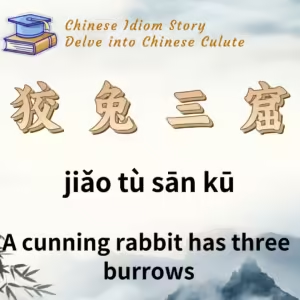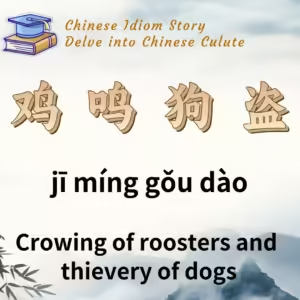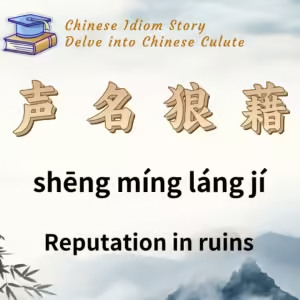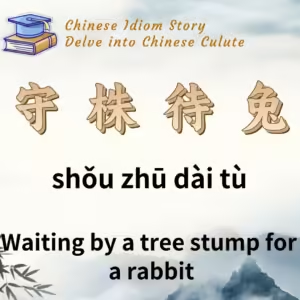
Chinese Idiom: 狡兔三窟 (Jiao Tu San Ku)
English Translation: A cunning rabbit has three burrows
pīn yīn: jiǎo tù sān kū
Idiom Meaning: This idiom metaphorically refers to having multiple places to hide, making it easier to avoid disaster. It can also imply being prepared with various plans or options to leave room for maneuvering.
Historical Source: “Strategies of the Warring States” (《战国策 · 齐策四》).
Idiom Story:
During the Warring States period, there was a high-ranking minister in Qi State named Meng Changjun (also known as Tian Wen). He was known for generously supporting guests, and his home was filled with thousands of food guests.
At that time, a man named Feng Xuan, who was so poor that he couldn’t support himself, asked someone to approach Meng Changjun for an invitation to become a guest in his household. Tian Wen agreed, but his subordinates, seeing that Feng Xuan had no particular skills, treated him poorly and served him the worst food.
Soon after, Feng Xuan leaned against a pillar, strumming his sword and singing: “Oh long sword, let’s just go back! Here, I can’t even get a fish to eat!” Meng Changjun’s attendants reported this to him, and he ordered them to treat Feng Xuan like any other guest, serving him fish.
After a little while, Feng Xuan again strummed his sword and sang: “Oh long sword, let’s just go back! Here, we can’t even find a cart to go out!” Meng Changjun, upon hearing this, arranged for Feng Xuan to have a cart.
Eventually, Feng Xuan strummed his sword once more and lamented: “Oh long sword, let’s just go back! Living here, I can’t even support my family!” When Meng Changjun learned that Feng Xuan had an elderly mother, he sent provisions for her so that she would not lack anything. After that, Feng Xuan stopped lamenting with his sword.
At one point, Feng Xuan approached Meng Changjun with a task: to go to his hereditary fief in Xue and collect debts. Upon arriving in Xue, Feng Xuan falsely claimed to be acting on Meng Changjun’s orders and canceled all debts for those who couldn’t pay, publicly burning the contracts. When he returned, he reported to Meng Changjun, saying, “I have completed my task and secured justice for you.” Meng Changjun was displeased.
A year later, the Qi King Qian was misled by slander and dismissed Meng Changjun from his position. Meng Changjun had to leave Linzi and return to his fief in Xue. When he was about a hundred miles away from Xue, the local people came out to welcome him, bringing their elders and children. Meng Changjun was very grateful to Feng Xuan, saying, “Sir, the justice you secured for me is clear to me today.”
Feng Xuan replied, “A cunning rabbit has three burrows, and that is merely enough to escape death. Now you only have one burrow and cannot sleep safely. Let me help you dig two more.” This meant that a clever rabbit needs multiple hiding places to truly feel secure. Feng Xuan then assisted Meng Changjun in gathering resources, including four horse-drawn carriages and five hundred taels of gold, and they went to the state of Wei. Feng Xuan told King Liang of Wei (also known as King Hui of Wei) that whichever state invited Meng Changjun to govern would surely become rich and powerful.
Upon hearing this, King Liang sent emissaries with gifts to invite Meng Changjun to be their prime minister. However, Feng Xuan hurried back and advised Meng Changjun not to accept the Wei invitation. The Wei emissaries visited Qi three times, but Meng Changjun did not agree. Observing that other kings valued Meng Changjun highly, Qi King Hua eventually acknowledged his mistake and reinstated him as prime minister.
As a nobleman of Qi, Meng Changjun sought Feng Xuan’s advice on asking King Hua to divide the sacrificial vessels of the late king and give him a share to build a family temple in Xue, thus securing and solidifying his position. After the temple was completed, Feng Xuan told Meng Changjun, “Now that the three burrows are ready, you can live safely.”
This story gave rise to the idiom “狡兔三窟,” which reflects the wisdom of having multiple options to ensure security and safety.






